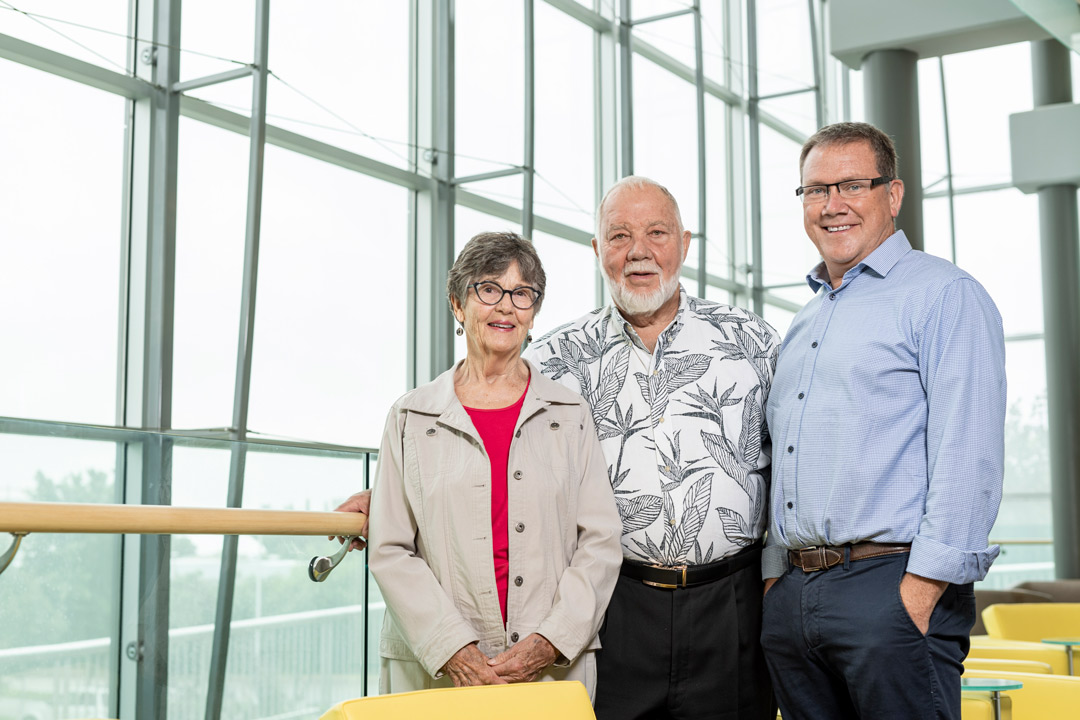
Building capacity to manufacture vaccines
Continued donor support will enable VIDO to expand its capabilities as Canada’s Centre for Pandemic Research
By The Globe and Mail | PHILANTHROPY IN CANDA REPORTIn their home community of Saskatoon, Malcolm and Marilyn Leggett are well-known for their generosity.
“We believe you’re judged for what you do – not what you own,” says Mr. Leggett, the now retired co-founder of NSC Minerals, a provider of salt for de-icing, industrial and agricultural applications. “We want to enhance the lives of all those around us. That’s what it is all about.”
Together with his wife, a former teacher for Saskatoon public schools, Mr. Leggett has supported many charitable endeavours. Last year, the desire to achieve a substantial impact inspired the couple to donate $1-million toward establishing the University of Saskatchewan’s Vaccine and Infectious Disease Organization (VIDO) as Canada’s Centre for Pandemic Research.
“VIDO has been around for nearly 50 years, and has developed a great number of vaccines,” says Mr. Leggett. “It has been very successful in bringing substantial benefits for society. But with the coronavirus pandemic, it has become evident that we need to do more, especially when it comes to building capacity for manufacturing vaccines.”
Support from the Leggetts – as well as other private donors and all levels of government – is helping to make a difference, says Volker Gerdts, VIDO director and CEO. “We greatly appreciate this extraordinary donation from Marilyn and Malcolm. Knowing we have this level of support from leaders in our community is critical to our organization and our vision for the future.”
VIDO’s focus is on rapidly responding to emerging human and animal diseases, and the past two years have served to highlight the importance of this work, Dr. Gerdts explains. “When the COVID-19 pandemic hit, our team was the first in Canada to isolate the SARS-CoV-2 virus from the first Canadian case in collaboration with Sunnybrook Hospital and Canada’s National Microbiology Laboratory.
“We were also the first to establish an animal model of SARS-CoV-2 infection. And we were among the world’s fastest in developing a vaccine candidate.” VIDO’s subunit vaccine, which contains purified viral proteins, will be tested in clinical trials in Canada soon – and will undergo evaluation as a booster in Canada.
Such achievements have brought the organization much recognition in Canada and beyond, notes Dr. Gerdts. “We already operate world-leading infrastructure for infectious disease research, including the largest high-containment facility. While this allowed us to quickly transition to studying COVID-19, the experience has also revealed gaps.”
For many years, experts at VIDO have advocated for building more research and vaccine manufacturing capacity, and for training the highly skilled workers needed for such facilities, and Dr. Gerdts welcomes continued donor support that will allow VIDO to expand its capabilities as Canada’s Centre for Pandemic Research.
“We are currently adding new animal housing and an in-house vaccine manufacturing facility. We will also upgrade key areas of our level 3 biosafety lab to containment level 4,” he says. “This will effectively double Canada’s capacity for level 4 research, which looks at the most severe and contagious diseases.”
VIDO’s goal is to enable Canada to be more self-sufficient in responding to new diseases as well as make a difference in pandemic preparedness globally, Dr. Gerdts says. “We’ve always been focused on developing solutions for humans and animal health to advance ‘one health.’ This is important as approximately 70 per cent of new human diseases come from animals.”
This drive to muster a robust response to health challenges has attracted the attention of a number of partners from industry, government and academia, “and these collaborations serve us well when it comes to achieving a big impact,” he explains. “We all realize that we need to continue funding our research and training facilities so we can be better prepared when the next disease comes along.”
Donors like the Leggetts can be assured that their support will help to boost outcomes not only for Canadians but people around the world, adds Dr. Gerdts.
This vision resonates deeply with the personal aspirations of Mr. Leggett. “This is far bigger than one vaccine, and being part of the efforts at VIDO is so rewarding,” he says. “This is our country; this is our world – and we need to take responsibility for it.”
What’s more, the couple regards the fact that this powerful potential can be realized in Saskatoon as a source of pride. “The university is such an asset for the country,” says Mr. Leggett. “It brings researchers and students, and really adds to our culture and quality of life.”
To join the Leggetts in supporting USask’s VIDO, visit: vido.org

